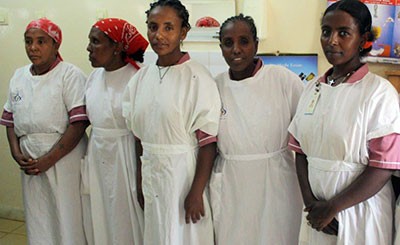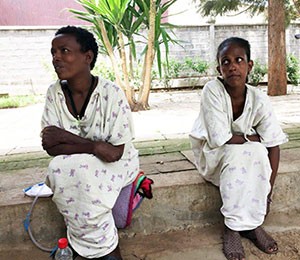
November 2015—In 1988, Mesaye*, a 15-year-old girl from North Gondor, Ethiopia, began to have contractions and knew that the birth of her first child was near. Unfortunately, like so many other young mothers whose bodies have not matured enough to safely give birth, Mesaye experienced an excruciating four days of labor that ended in a stillbirth.
Access to emergency obstetric care, including caesarean section, would no doubt have saved her baby’s life. However, Mesaye’s ordeal was not finished. Due to a hole created between her birth canal and bladder from the prolonged labor, as well as nerve damage to her leg, she developed urinary incontinence and continuous pain in her foot.
Her condition, known as obstetric fistula, is common in Ethiopia and parts of the world where early marriage is the norm and where most women give birth at home without skilled attendants or access to emergency obstetric care. Obstetric fistula can lead to a lifetime of both physical disabilities and psychological consequences, including being ostracized from families and communities.
This was the case with Mesaye, who was taken by relatives to another village to avoid the stigma of fistula. She never saw her husband again. Two years later, relatives took her to a health center where she was referred to the Hamlin Fistula Hospital in Addis Ababa. At the hospital, doctors repaired her fistula and, as a result, she no longer leaks urine. She was also told she could remarry and have children if she wanted, though she chose to remain single.

Mesaye also decided to give back to the hospital and to women like herself by training to be a nurse aid among other women who have experienced fistula. Today, she works as a nurse aid at the Hamlin Fistula Center in Bahir Dar, in the Amhara region of Ethiopia.
Mesaye is happy to be doing such important work. “I passed through that challenge, and I know how they feel. I want to help these women regain their lives,” she says.
USAID is supporting fistula prevention and treatment and women’s rehabilitation and reintegration into society in Ethiopia through the Evidence to Action project and the Integrated Family Health Program led by Pathfinder International. Program interventions are taking place in 291 woredas (subdivisions) in the regions of Amhara, SNNPR, Tigray and Oromia and support the Federal Ministry of Health’s aim of eliminating obstetric fistula by 2020.
Fortunately, the incidence of obstetric fistula is much reduced since the time Mesaye delivered her stillborn son. Ethiopia has since passed a law requiring that women be 18 years old before marrying, though it is rarely enforced in rural areas where traditional norms remain strong. Contraceptive prevalence increased from 27 percent in 2008 to 39 percent in 2013, while skilled delivery increased from 7 percent to 36 percent in the same period.
Despite these improvements, it is an uphill battle to prevent the estimated 3,500 new cases of obstetric fistula each year. The majority of Ethiopian women still give birth at home without skilled attendants, do not use a family planning method, and marry early. While elimination of fistula may be many years away, access to fistula repair is growing, and the Federal Ministry of Health and regional health bureaus are prioritizing fistula case identification and treatment.
The five-year Evidence to Action project, which began in 2011, is part of USAID’s ongoing efforts to improve access to family planning services, prenatal care, and emergency maternal and obstetric care in Ethiopia, all of which help to prevent obstetric fistula. The Integrated Family Health Program, which began in 2008, is designed to reduce the country's maternal, neonatal and child mortality.
*Full name not available.
LINKS
Follow @USAIDEthiopia, on Flickr, on YouTube, on Facebook







Comment
Make a general inquiry or suggest an improvement.